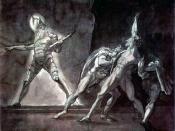Hamlet was written in 1601, a time when society was changing from the old feudal society, a society where the King held absolute control, affecting everybody and everything beneath him. Throughout Hamlet, the effects a corrupt King has upon his kingdom are portrayed. These changes foreshadow 17th century England and as such, the play is a metaphor for chaos witnessed in countries during times of extraordinary change. Notwithstanding this, the play is equally relevant toward a changing state today, as it was during Shakespearean England. Hamlet is the only constant character who defies decay, degeneration and maintains his integrity until the end. Hamlet, faced by corruption everywhere, enters the play a boy but exits a man.
Hamlet decides his own destiny and is not corrupted, either by Denmark or his corrupt uncle. His resolution is clear from the beginning until his end - to restore order in Denmark. Discovering the truth of his Father's murder, he commands Horatio and Marcellus to never speak of the sighting, to say nothing about the ghost, and understand that he will:"â¦to put an antic disposition onâ¦That you know aught of me - this do swear" (Act 1, Scene 5, Line 177 - 185)The trust between Horatio and Hamlet is constant throughout.
When alone together, Horatio is the only character to whom Hamlet is his true self and in this, he trusts Horatio completely. Through Horatio the audience hears the real Prince of Denmark ordering both Horatio and Marcellus to 'swear' on oath six times, symbolising the loss of trust within the state. Such is the anxiety caused by the loss of the old feudal order, gone with the death of the old king.
Hamlet lives with a sense of inherited right, perhaps divine right, to avenge his father and restore order in Denmark and...


